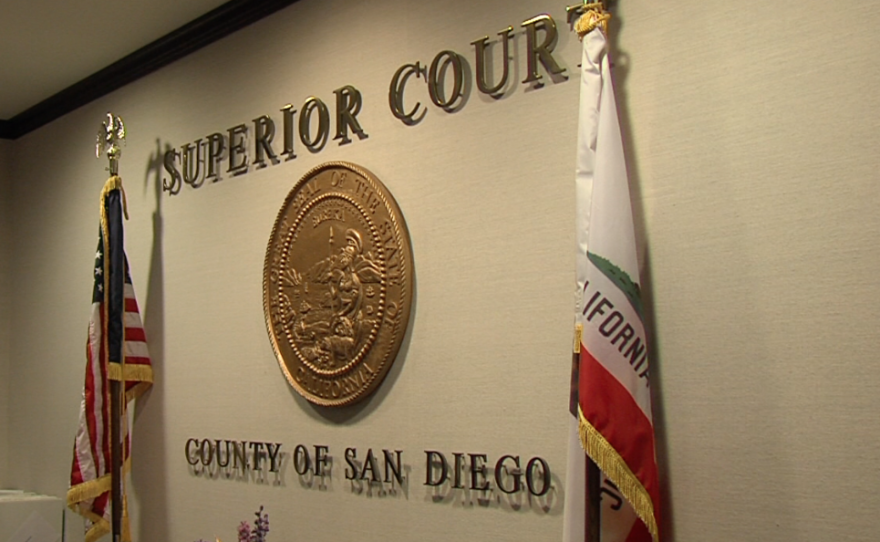Have you ever left your ballot blank when it came to voting for superior court judges?
San Diego Mesa College and University of San Diego political science professor Carl Luna has some advice for deciding how to vote on those races.
Luna joins Midday Edition Tuesday for the second installment of San Diego Politics 101. In the second episode, Luna answers questions about electing judges.
RELATED: Local Politics 101: Running For School Board
The answers below have been edited for clarity and brevity. To hear the full interview listen to the Midday Edition podcast.
Q: Justin Schiffer of San Diego asked: Why do we elect judges here? Lots of municipalities and states don't do that, so what is the advantage? It seems like a situation where electing judges would be ripe for a situation of conflict of interest and give the appearance of a quid pro quo.
A: The short of it is because we do. We've done it for over 150 years. The question is, if you allow governors and the rest to appoint judges, will they then control the judges? So in California the prejudice is, and most states, 40 states pretty much, it's to let the voters pick the judges so they won't be beholden to the other elected officials. So most states do this, the federal government doesn't. And in California we mix it. Supreme court, appellate court, governor appoints and eventually the voters get to vote on them (in a retention referendum). Only at the superior court level do you have frequent elections.
Q: And there are 47 superior court judge offices. Why so many?
A: Well, that's just on the blocks for this election cycle. We have something over a hundred different departments. Because you've got the North County, the South County, East County, downtown, family services, traffic court. They rolled all the municipal court judges into the superior courts about 20 years ago. It sounds like a lot but it's a couple hundred judges serving the needs of 3 million people. You go to a small county like Alpine County in California, they've got a couple thousand people that each judge represents. Here each one has to take care of 12,000 people.
128 judges and 18 commissioners serve more than 3.1 million people in San Diego County.
Q: Now most of the judges' races only have one candidate on the ballot. What's the point of voting in those races?
A: Well, you want to pay attention to at least who they are. The rule of thumb for voting on judges, if you know who they are they've probably gotten into trouble. If they haven't gotten into trouble, they're just doing their job, they're an elected judge, pretty much you're going to say yeah to them, their return rate is very high.
According to the Candidate Filing Guide from the San Diego County Registrar of Voters office:
"The names of unopposed judicial incumbents do not appear on the June Primary Election ballot and they will be declared elected after the November general election. For a contested office, the candidates’ names will appear on the June Primary election ballot. If one candidate receives over
50%, he/she shall be elected in the Primary. If no one receives over 50%, the top two candidates will run off in the November general election."
Q: Are judges prohibited from running active political campaigns?
A: They can't run real partisan campaigns. These are non-partisan races. In California, that's the big thing we changed in the early 20th century was turning from partisan races, which about a dozen states still allow for their judiciaries, into non-partisan races. And here, for the most part, you don't think that much about the partisanship of a judge, but there have been a couple of campaigns ran in recent years that raised eyebrows and some oversight that they were too political.
Q: Judges still do raise money for their campaigns though, right?
A: Yeah, judges can still raise money. They're still subjected to restrictions on who they can get it from. And the tradition is, you're not supposed to use it in an overtly negative way. The bar for judges on what they can do for campaigns is much higher than what we hold other elected officials to. They're supposed to advance their own image but not attack their opponents.
Q: Only 2 of the 47 judges' races this year have more than one candidate. If I am going to vote on a race for a judges' seat, how do I go about evaluating the candidates?
A: You look at the candidates and you do the Google and if they have anything in The San Diego Union-Tribune or in Voice of San Diego you can get background on them. Ballotpedia will always have background on the judges.
Q: Are there any assessments made by the local bar association about whether a candidate is fit to be a judge?
A: You'll hear weigh-ins and you can find those also online, The San Diego Union-Tribune will report on these and the rest. The political parties will also weigh in.
Do you have a question about local politics, local elections or why the process works the way it does? If so, ask us here: San Diego Politics 101 — the KPBS Midday Edition segment where your questions get answered







